‘You’re just sheeple.’ Sacramento region wrestles with masks and manners as economy reopens
Victor Hinojosa and his fiance Brittany Kaighen went shopping for an engagement ring last week, pandemic or no pandemic.
The couple stopped in at the Kenny G & Co. jewelry store, which had just reopened at the Fountains at Roseville shopping center. They leaned against the glass counter while owner Kenny Gordon showed them a sampling of rings.
Social distancing took a holiday. Hinojosa and Kaighen were nowhere near six feet away from Gordon. None of the three wore a mask.
“Rings look better without a mask,” Kaighen said afterward with a laugh, while Hinojosa sheepishly admitted he’d forgotten his at home. For his part, Gordon was startled when Hinojosa offered to shake his hand; he made him settle for an elbow bump.
This is the awkward dance Californians are doing in this new phase of the coronavirus pandemic.
People are going out more. Restaurants in some areas are serving sit-down meals, and doors are opening at stores that had previously been deemed non-essential.
In short, society is inching back to some sense of normalcy as Gov. Gavin Newsom relaxes some of the stay-at-home restrictions he imposed in March. Newsom announced new guidelines Monday designed to accelerate the reopening of businesses.
But for all the relief that’s brought to customers and business owners alike in a desperately sinking economy, it’s creating problems of its own.
The easing of the coronavirus rules is often forcing restaurant owners and shopkeepers into a delicate, if sometimes unspoken, set of negotiations with customers over public health protocols and basic pandemic etiquette as COVID-19 continues to stalk the state.
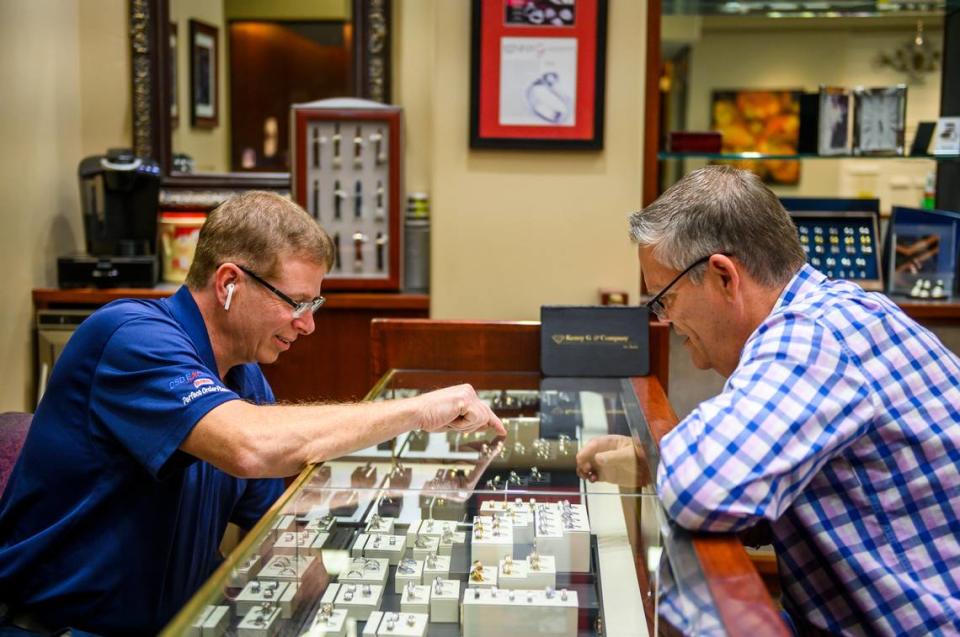
Should everyone wear a mask? Should they be required to? How do you keep customers six feet apart? What do you do if they ignore social distancing?
There’s perhaps a bigger question, one that goes beyond behavior in shopping centers and extends to the broader society: Will the gradual reopening of the economy cause California’s increasingly restless population to abandon the cautious approach most have been taking toward the coronavirus?
“I’d have to say, in the last few weeks, I’ve seen fewer masks,” Scott Savoi said as he and his wife Carreen – both wearing facial coverings – strolled around downtown Grass Valley. “I’m not as full-bore with the mask as I was maybe two or three weeks ago.”
With stores starting to reopen, the Savois were delighted to be out walking last Friday. They felt safe, hardly giving a glance as a couple without masks brushed by them on the sidewalk. If they think someone’s crowding them or making them uneasy, “I just walk away,” Carreen said.
Some areas of California have set hard-and-fast rules, particularly when it comes to facial coverings. Most of the Bay Area and Los Angeles County require residents to wear masks in public. Sacramento Mayor Darrell Steinberg has asked Sacramento County to impose a similar requirement when restrictions on dining and shopping are eased.
But in jurisdictions where masks are optional, life is often filled with uncomfortable uncertainty. Business owners must weigh the need for safety against the genuine craving to welcome customers back in their stores.
This balancing act becomes particularly precarious in counties that have received Newsom’s blessings to reopen their economies a step further than the rest of the state.
In these mostly rural and suburban counties, where coronavirus infections have been comparatively rare, stores can allow shoppers inside and restaurants can serve sit-down meals, so long as social distancing is respected and other safety rules are observed. Many business owners are just beginning to figure out what this means.
Zhush Modern, a trendy clothing and decor shop, occupies a side street in Auburn’s cozy Old Town business district in Placer county. The store’s owner, Christine Ubbink, wants her customers to wear masks. But she won’t force the issue.
Her solution is to offer them for sale and try not to alienate anyone who declines.
“It’s a dilemma. Who am I to say they can’t come in if I’m trying to make rent?” said Ubbink, who was still wearing her mask as she locked up for the day last week. “I figure as long as I’ve got mine on, we’re halfway there.”
‘Enter at Your Own Risk’
With just under 100,000 residents, largely rural Nevada County has had comparatively few problems with COVID-19: just 41 confirmed cases and one death as of Monday. So it wasn’t surprising that Nevada was among the first to get the governor’s green light to reopen its stores and restaurants.
Within days, the impact of the state’s decision was clear. Late last week, downtown Grass Valley was starting to awaken from its two-month-long hibernation. At least one-third of the shops were open, and many were allowing customers inside. Some limited the number of customers who could come in at once.
Crystal Empire Gems, a jewelry and gem shop on Mill Street, required customers to wear masks – and offered them for free in a basket by the entrance.
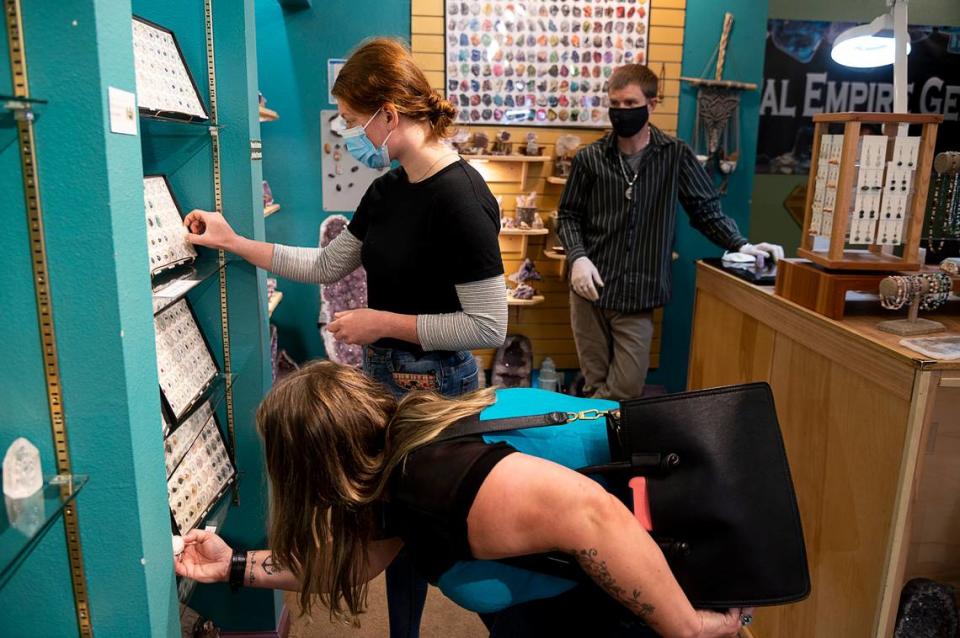

Around the corner, a gift shop called Make Local Habit offered a bit of gallows humor with a sandwich sign on the sidewalk saying, “Enter at Your Own Risk.” But the sign also strongly encouraged masks and the store was offering them for sale.
There were customers out and about in Grass Valley, but business wasn’t exactly humming yet. And to a certain extent, that was OK for the time being with at least one store owner.
“I want people to come in. But if a whole bunch of people come in, it wouldn’t be a good thing,” said Shoshana Doan, who owns Country Wood Furniture with her husband, Tom. “We’re walking that line right now.”
Doan installed a flexible clear-plastic sheet – the kind normally used to hang posters – in front of the cash register. She had a mask around her neck but said that, as a retailer, she sometimes feels uneasy putting it over her mouth and nose with customers around.
She does it anyway, but said, “It’s important to see each other’s faces.”
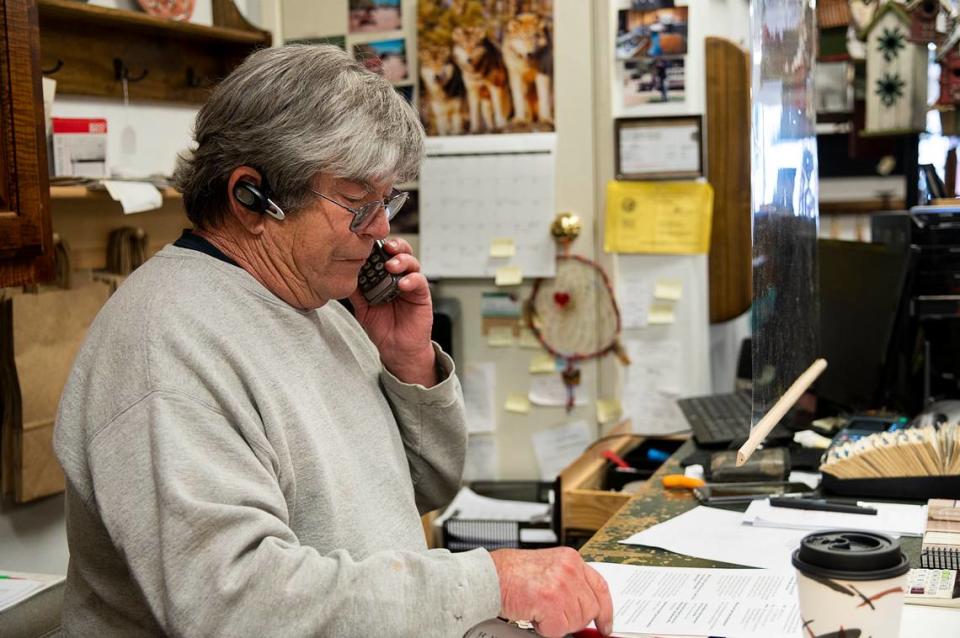
Dan Hinckley’s face was visible for all to see as he walked around downtown Grass Valley with his family.
He explained that masks are pretty rare at the lumber yard where he’s a salesman, although he and his co-workers are conscientious about social distancing.
But even that starts to break down sometimes when customers come in.
“It’s a blue-collar community,” Hinckley said with a shrug.
A large gathering in Sacramento
Sacramento’s retail scene is still pretty quiet.
Restaurants in Sacramento County still can’t allow diners inside. Many stores have yet to reopen, even for curbside pickup allowed under Newsom’s easing of the shutdown rules. Unlike nearby counties such as Placer and El Dorado, Sacramento still hasn’t secured its “local variance attestation” from the state, which would allow customers to go inside retail establishments.
But last Thursday night, the parking lot at Sacramento’s Howe ’Bout Arden shopping center was one of the liveliest places in the city.
While the shopping center itself remains mostly closed, about 200 motorcycling enthusiasts gathered in the lot for the weekly reunion they call Bike Night.
“We’re all pretty good about keeping our distance,” biker Rafael Florea said. “We each take up a parking spot and hang out by our bikes.”
In truth, social distancing wasn’t strictly enforced. While some of the bikers stayed at least six feet from each other, many others clustered in groups of six or eight, with little distance between them. Few wore masks.
Florea said the meet-up wasn’t any sort of protest or act of defiance against Sacramento County’s guidance on large gatherings. It was simply a chance to see friends.
“It’s just nice to get out once a week to come out and enjoy a passion with likeminded people,” he said.
Officials have said from the start of the stay-at-home orders that people should get out in the fresh air. But big gatherings like Bike Night illustrate the types of challenges that will arise as spring turns into summer and the coronavirus pandemic persists. People want to be out in public.
Count Leah Sherman among those with cabin fever. Owner of Hellcat Riding, a motorcycle apparel company, Sherman has watched her revenues fall 90 percent. Add to that the disappointment that the Sacramento Mile, a motorcycle race scheduled for last weekend at Cal Expo, was called off.
“There are no events going on,” Sherman said as she took in the Bike Night scene. “It’s the worst I’ve ever seen. Everything is shut down right now.”
Bike Night was Sherman’s first public outing since Valentine’s Day – when she was diagnosed with multiple sclerosis. The National Multiple Sclerosis Society says the disease doesn’t increase the likelihood of contracting COVID-19 but warns its members that certain treatments for MS could heighten the risks.
That wasn’t going to deter Sherman, who wasn’t wearing a mask.
“I’m high risk, but I don’t want to live in fear,” Sherman said. “I know what can possibly happen, but I’m positive about life.”
The cautious stay away
The area’s largest mall, the Westfield Galleria at Roseville, isn’t reopening until Friday. Its next-door neighbor, the open-air shopping center Fountains at Roseville, began a gradual reopening last week. A handful of stores allowed shoppers inside.
Business was light at first, with relatively few people strolling the giant outdoor plaza last Thursday afternoon. By Saturday, the crowds had picked up and as many as one-third of the stores were open — a few for curbside service only, while the rest were allowing customers inside.
Few shoppers were wearing masks anywhere at Fountains, with the exception of a couple of stores that insisted on it. Whole Foods had an employee perched at the entrance, regulating the flow of people going in and offering free masks. Some people took them, some didn’t; all were allowed in.


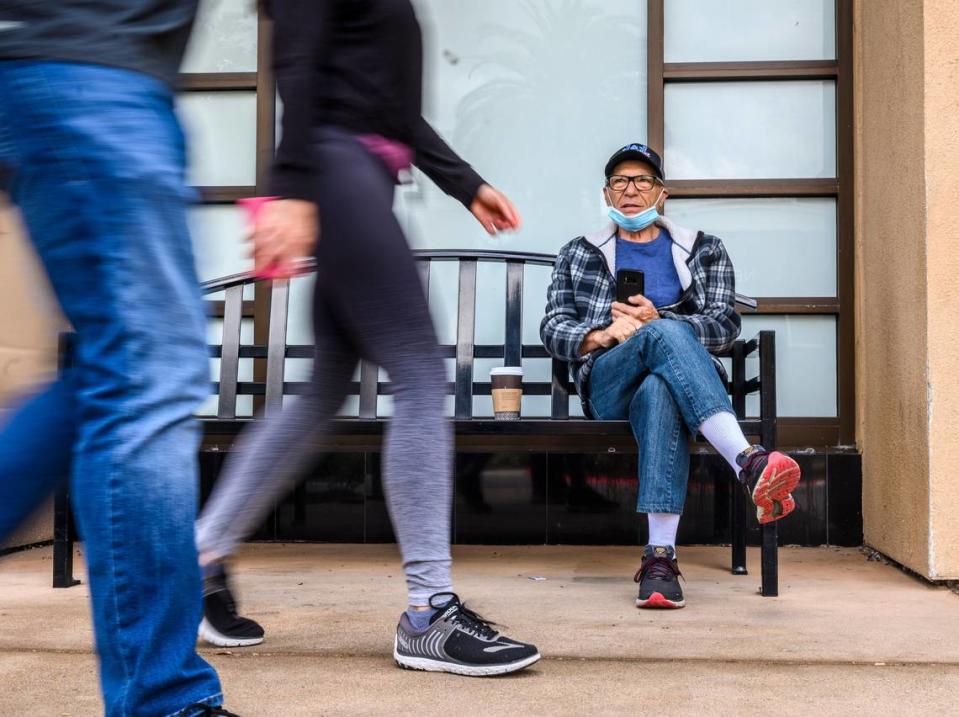
At nearby Newcastle Classics, a clothing and toy shop for babies and toddlers, owner Brittany LaGala was pleased that customers were eager to venture in. Newcastle was offering masks to customers who wanted them but had few takers.
“They don’t seem to be as scared as I thought they’d be,” she said. “They’re happy to be out and socializing. The ones who are more cautious are staying away.”
To wear, or not to wear? The donning of masks has become one of the hottest topics of the day, and a marker in the ongoing debate about how serious the pandemic truly is.
The internet is replete with stories about “mask shaming,” including the tale of two men arrested in Los Angeles for assaulting Target employees who were escorting them out for refusing to wear masks.
Shashi Dosaj, who runs a consulting firm called the California Institute of Etiquette, said retailers are struggling to figure out how to get customers to obey the rules.
“We cannot change people by shaming them,” said Dosaj, who coaches business people on manners. “This is definitely a very difficult topic. How do you please everybody?” She said the potential for friction will grow “as we open up the economy in waves.”
At Yuba Blue, a Grass Valley clothing store, customers are required to wear masks – largely because one of the employees has asthma and was reluctant to return to work otherwise.
The policy hasn’t rankled Yuba Blue’s customers, said owner Lillie Piland. A couple of shoppers did leave rather than don masks, but said they’d return when life returned to normal.
“We haven’t had to deal with anyone being rude,” Piland said.
‘You’re just sheeple. You’re just sheep.’
The shaming issue cuts both ways.
Susanne Baremore traveled from Mendocino County to her former hometown of Redding to clean the apartment of a friend who killed herself after becoming severely depressed as the economy collapsed.
Baremore stopped at Walmart and Costco for cleaning supplies. At each store, she said she was accosted by people offended she was wearing a mask.
At Costco, she had just gotten out of her car and was donning her mask when a woman walked by and said, “ ‘Oh, so you believe the lie?’ “
Baremore stared back but said nothing. The woman continued badgering her: “You’re just sheeple. You’re just sheep.”
At Walmart, as she waited for a shopping cart, she stood back from other shoppers in an obvious attempt to practice social distancing.
A man confronted her.
“What are you really afraid of?” the man said, edging uncomfortably close.
Baremore said the encounters left her shaken.
“I’ve been in the Redding Walmart when it was extremely crowded like at Christmas and times like that and had people be more polite than they were during social spacing,” Baremore said. “I don’t understand.”
Judy Salter had a similar experience. Salter, who is 71 and has a compromised immune system, was at a Redding Safeway last week and encountered a man who was ignoring the directional arrows placed on the floor to discourage face-to-face congestion.
“I put on my curious voice and I said, ‘Oh gosh. Hi! You know they’ve got these arrows going now so we don’t have to go next to each other. So maybe when you go to the next aisle, notice the arrows.’ He said, ‘I’m not going to pay any GD attention to those arrows, and you’re a fascist bitch.’ “
She replied the arrows were placed “to help us older people.”
Dosaj’s advice? When it’s a friend or relative, by all means suggest they follow the rules, whether it’s about face coverings or social distancing. Otherwise, try to ignore them and keep your distance.
“It’s best practice not to say anything … when you’re interacting with strangers,” the etiquette expert said.
Waitresses with clear plastic shields
It seemed like the most popular place in Roseville Saturday was Yard House restaurant at Fountains. While diners occupied every available table inside and on the patio – seating has been slashed to accommodate social distancing – a half-dozen parties waited outside for a table.
Peggy and Anthony Fiedler, who were among the groups waiting for a spot to open up, said there was no reason not to have a sitdown meal. The pandemic has claimed no fatalities in Placer for more than two weeks, one of the reasons restaurants in the county can allow diners inside.
“In Placer County, we’re pretty much under control,” Peggy Fiedler said.
Should restaurants even be forced to reduce occupancy? Fiedler is OK with that if it eases other customers’ anxieties. “It’s for people’s comfort zone, comfort level,” she said.
Permitting restaurants to open their doors has been one of the most visible symbols of Newsom’s efforts to revive the economy. But there’s a plethora of guidelines from the state, including meticulous rules about sanitizing tables and equipment, and a requirement that management check employees’ temperatures.
Not surprisingly, there’s been some confusion.
Q1227, a restaurant that opened last fall in Roseville’s Stone Point plaza, was prepared to open its patio last week but manager and co-owner Tamara Bennett said she wasn’t sure how the staff would be able to take every customers’ temperature. (The state recommends checking customers for COVID-19 symptoms, but it isn’t mandatory).
Then the owner of a nearby restaurant mistakenly told Bennett and her co-owner husband, who goes by the name Chef Q, that they couldn’t legally open until this week. (Placer restaurants could, and did, start opening last week).
The Bennett’s are now preparing to open Tuesday, although they weren’t overly dismayed to learn they could have opened sooner.
“I didn’t want to rush into it anyway,” said Chef Q. “Just making sure we go about it the right way.”
Over the weekend they were attending to details, like getting matching masks for the employees and glass dispensers for the sanitizers. They planned to strongly encourage customers to make reservations rather than wait in line at the door.
“How do you stay elegant? How do you do that?” Tamara Bennett said. “That’s what we’re thinking through.”
In Old Town Auburn, Lisa Ford thinks she’s hit on a solution for blending aesthetics with safety.
Ford is co-owner of Auburn Ale House and its sister restaurant, The Annex. She and her husband reopened The Annex last week and had the waitresses wear clear plastic shields over their faces.
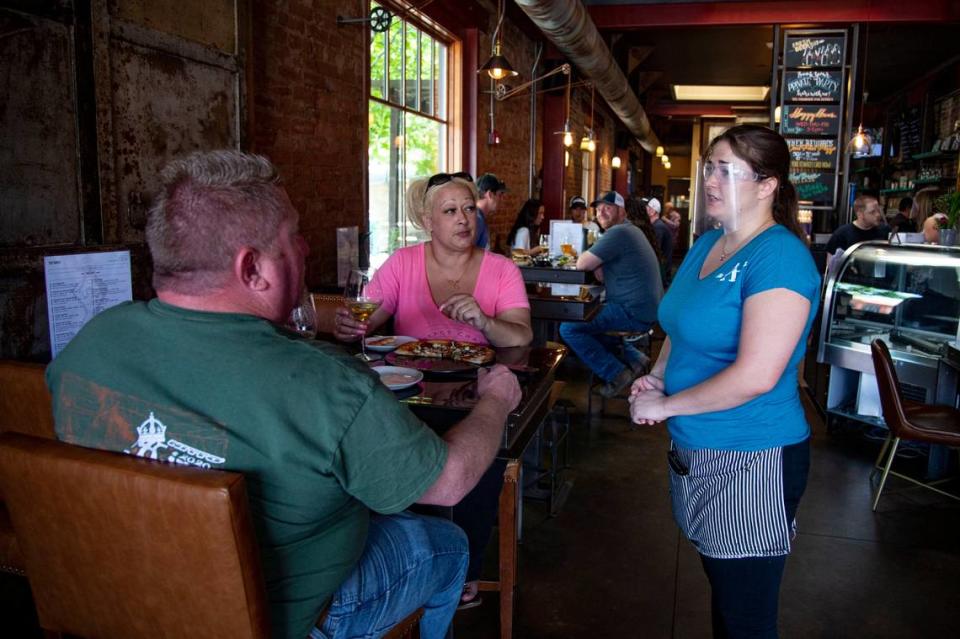
Ford said the shields are more sanitary than masks — they can be cleaned more easily — and serve another purpose.
“People can see your eyes, your smile,” Ford said. “I felt that’s a more appropriate way to serve the public.”
For all her precautions, Ford said some Auburn residents complained to Placer health authorities that the restaurant had jumped the gun and reopened illegally.
She chalked that up to her prominence in the community, which “makes me a target.” She said the complaints also resulted from the confusion among the general public about what’s safe and what isn’t.
“People aren’t sure who is the best expert to listen to,” Ford said. “This is a very volatile time. This is a very emotional situation.”

